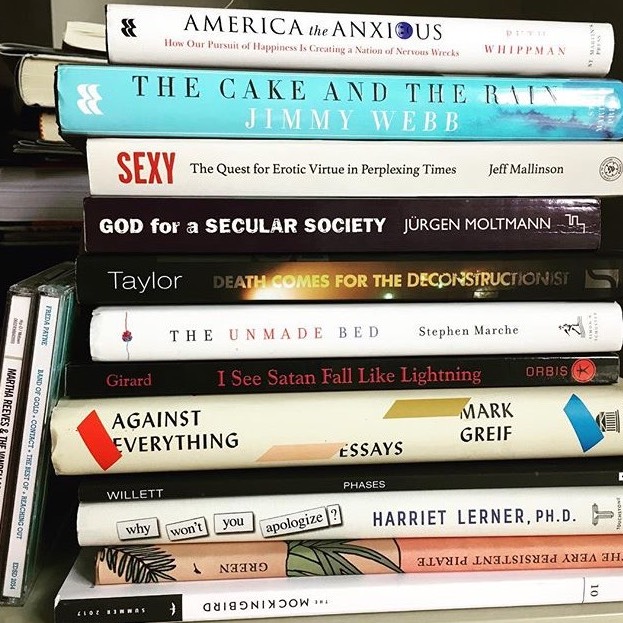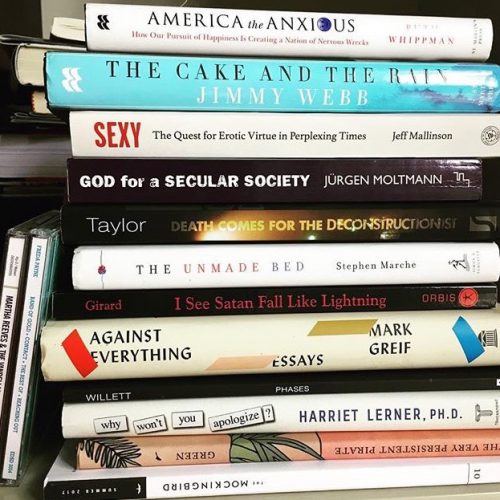
 As summer winds down, here’s what we’ve been reading over here at Mockingbird HQ (and on sabbatical), as published in the Love & Death Issue…
As summer winds down, here’s what we’ve been reading over here at Mockingbird HQ (and on sabbatical), as published in the Love & Death Issue…
Lincoln in the Bardo by George Saunders
George Saunders’ widely acclaimed first novel addresses death, grief, and the afterlife. Narrated by a graveyard full of, um, lively ghosts, this novel is a roller coaster from start to finish. With humor and empathy, Saunders powerfully illustrates that “the truth will set you free.”
Hallelujah Anyway: Rediscovering Mercy by Anne Lamott
Published this spring, Lamott continues to sing the song of grace: “Mercy is radical kindness. Mercy means offering or being offered aid in desperate straits. Mercy is not deserved. It involves forgiving the debt, absolving the unabsolvable.” Pulling from St. Augustine and the Dalai Lama, she weaves her thoughts on mercy with such honesty and humor that you might feel like you’re sitting down as one of her Sunday School students.
The Kingdom by Emmanuel Carrère
Emmanuel Carrère’s new book (novel? memoir? biography?) on St. Paul and the early Christians often reads like a diary fused with historical fiction. Carrère, well-known in France for his unique non-fiction storytelling, believes that the only way he can really communicate a subject is by looking as honestly as possible at himself. In this book, then, that means capturing the New Testament through his own relationship with and (un-)belief in its God. A powerfully honest and captivating reimagining of both the nature of belief and the radical message Paul carried.
The Unmade Bed: The Messy Truth about Men and Women in the 21st Century by Stephen Marche
Stay-at-home dads get no respect, women are still almost never in the boardroom, and feminism has failed us. Why, Marche ponders, have we come so far and are still inundated with the same bizarre problems? Because women are still women and men are still men, and no one wants to make the damned bed. If you are in ministry, your premarital counseling couples should read this brilliant book alongside Capon’s Bed and Board.
My Utmost: A Devotional Memoir by Macy Halford
Halford, who spent several years working as a staffer at The New Yorker, writes with immense care and loyalty about the devotional that shaped (and continues to shape) her life, Oswald Chambers’ My Utmost for His Highest. Halford, who was raised in an Evangelical family in Dallas, uses the devotional (and Chambers’ own life story) as a way of excavating her own life and Christian faith.
Against Everything: Essays by Mark Greif
Greif is the co-founder of culture magazine n+1. This book synthesizes the strangeness of the modern world by challenging it and unpacking everyday taboos like exercise, hipsters, and punk music. Greif shows his cards as an Enneagram 8, but that doesn’t stop him from writing some real sizzlers on everyday life through a decidedly intellectual lens.
Abandon Me: Memoirs by Melissa Febos
One of our guests on The Mockingcast, Febos’ cutting collection of memoirs wrestles with addiction and sexuality and offers up a gratifying depth of spirituality. Her riff on the Jonah story and our innate calling towards “choose your own adventure stories” is one for the ages. She writes, “every love is a sea monster in whose belly we learn to pray.”
The Idiot by Elif Batuman
Ripping its title from a Dostoevsky classic, Elif Batuman’s debut novel follows Selin through her first year at Harvard. Upon arriving at school, she’s given an email address, her first. One night, she sends a snappy message to Ivan, the mysterious boy in her Russian class, and hilarity ensues. The romance would fit well in a 19th century novel—excepting Selin and Ivan’s preferred form of communication. Armed with a healthy suspicion of her surroundings and a sharp wit, Selin makes for a revelatory, refreshing narrator.
Why Won’t You Apologize? Healing Big Betrayals and Everyday Hurts by Harriet Lerner
 This little book ranks up there with our other social science fave, Mistakes Were Made (But Not by Me). Lerner gives us a powerful glimpse into all the strategies and self-deceptions we have around our wrongdoing–on what counts as an apology, and on what keeps us from giving (and receiving) it. She also insightfully keys in on the prime impulse that makes the non-apologizer a non-apologizer: the need to be perfect.
This little book ranks up there with our other social science fave, Mistakes Were Made (But Not by Me). Lerner gives us a powerful glimpse into all the strategies and self-deceptions we have around our wrongdoing–on what counts as an apology, and on what keeps us from giving (and receiving) it. She also insightfully keys in on the prime impulse that makes the non-apologizer a non-apologizer: the need to be perfect.
Phases: Poems by Mischa Willett
Poems playful, at times, epigrammatic, conscious of things Italian and incongruous—they are delightful and plain spoken, rhythmic and musical, at times difficult enough to slow the reader’s march through them, most times sufficiently welcoming and placed (e.g., the Pacific Northwest) to keep the reader coming back for more. The collection’s nine brief sections are laid out as though phases of a voyage. An exciting new volume in the Poiema Poetry Series (Cascade Books), curated by poet/editor D. S. Martin.

COMMENTS
Leave a Reply












